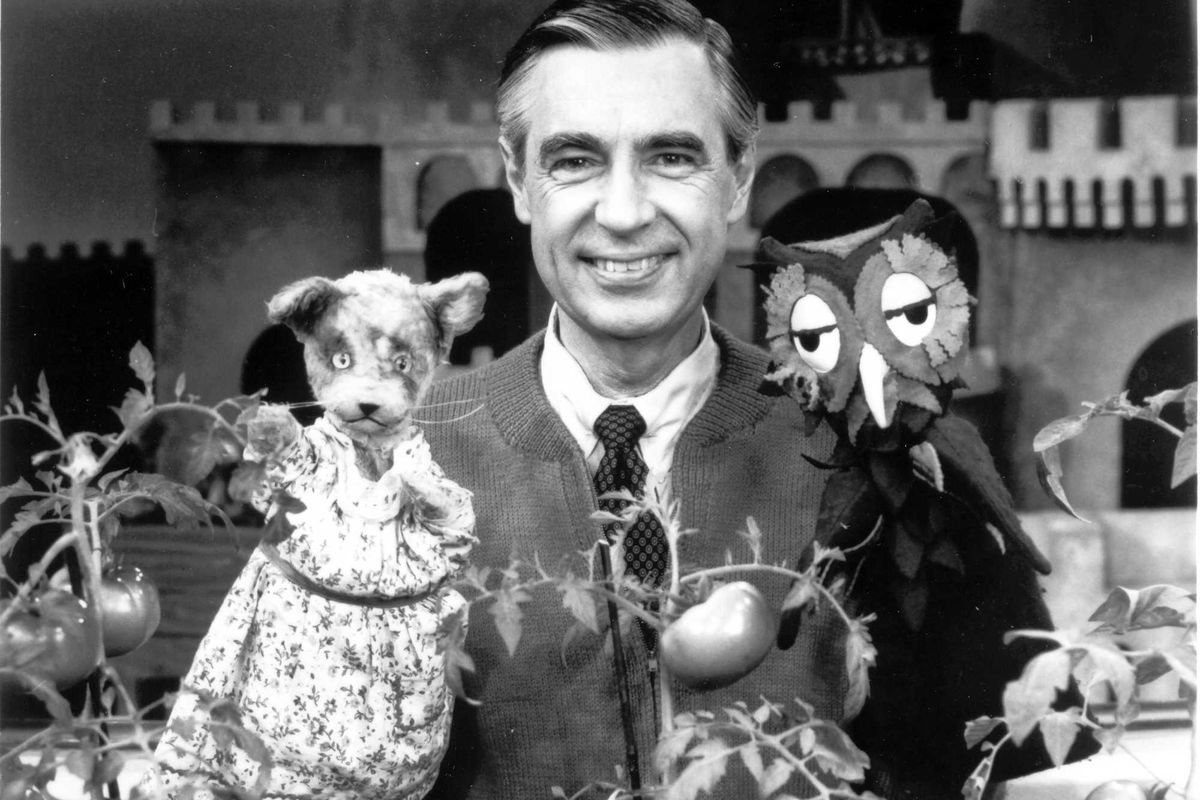Resurfaced interview shows Mister Rogers beautifully reflecting on how he wanted to be remembered
Mission accomplished.
Henrietta Pussycat, Fred Rogers, X the Owl
It's not especially unique to state how extraordinarily lovely and special Fred Rogers was. He was a gentle, thoughtful man who seemed to want to make the world a little bit better every day. And it wasn't just the years on his PBS show Mister Rogers' Neighborhood or the magical make-believe lands he built for kids (and quite frankly) their parents. He worked extensively to study the minds of children so he could help them feel heard, all while simultaneously advocating for them in educational spaces.
In addition to being a beloved TV figure, he was a champion for entire families and he put his expertise to good use. A recent interview clip from the Television Academy making the rounds proves that he was not only unbelievably kind, but that his humility seemed to know no bounds.
In the clip, Rogers is asked how he wants to be remembered.
At first pensive, Rogers starts by sharing a story about another famous celebrity (whose name he omitted), who had asked, "Do you think I'll be remembered?" Rogers thoughtfully responds with, "I'm sorry that he had such misgivings about that, you know?"
As for himself, the legacy he wanted was simple: "I'd just like to be remembered for being a compassionate human being. Who happened to be fortunate enough to be born at a time that there was this fabulous thing called television that could allow me to use all the talents that I'd been given."
The video has so far garnered over 2,000 lovely comments. One person writes, "Mere seconds into this video and I'm already crying. I just adored him. I didn't have other kids to interact with until I went to kindergarten, so I'm pretty sure he was my first friend."
Another shares quite simply, "A good man. A good human. That's how I'll always remember Mr. Rogers."
Another, commenting on the hardships of today's world, had a positive spin—perhaps not unlike how Mister Rogers himself would have framed it: "He would be so disappointed in the world right now... but he'd still show up, slip into his house shoes, a comfortable cardigan, and walk us through emotionally processing the negative spaces, finding the helpers, and reminding us that we're all in this together. I miss him."
The clip was a part of a longer interview wherein Rogers discusses his childhood, his family, and how the "land of make-believe" came about on his popular PBS show, among many other fascinating revelations.
Fred Rogers shares stories about his life. www.youtube.com, FOUNDATION Interviews, Television Academy
He shares the importance of inspiring others by actually caring about what you're teaching: "When I was a senior in high school, a friend of mine taught me to fly in a little Piper Cub. And he was so enthusiastic about flying, I know that's why I wanted to learn. The best teacher in the world is someone who loves what he or she does. And just loves it in front of you."
He explains how he carried this idea over to Mister Rogers' Neighborhood, saying, "And that's what I like to do with the neighborhood. I love to have guests and just create a whole smorgasbord of ways for the children to choose. I mean, some child might choose painting. Some child might choose playing the cello. But there are so many ways of saying who we are and how we feel. Ways that don't hurt anybody. And it seems to me that that's a great gift. Well, television can do that all the time!"
Fred Rogers discusses "The Neighborhood of Make-Believe" in an interview with the Television Academy. www.youtube.com, FOUNDATION Interviews, Television Academy
He digs a bit deeper into the majestic make-believe land and what he drew from to create it: "King Friday thought it would be nice to have a wife. And so Queen Sarah came along. Her name was Sarah Saturday. And it gave us a chance to have a wedding on the neighborhood. It gave us a chance to have the birth of a child. To deal with that. And there was Harriet Elizabeth Cow. And Sarah, of course, was the first name of my wife. My wife's name was Sarah Joanne. So of course she would be the queen."

